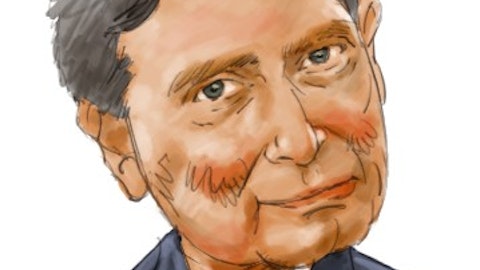Nick Yulico: Great. I appreciate that extra commentary.
Operator: The next question comes from Anthony Paolone of JPMorgan.
Anthony Paolone: I just have one. Michael, if I got your comment right earlier, I think you mentioned debt markets are pretty open right now for retail. And so I was wondering if that creates any opportunities for you all to get paid back on your prep interest in the JV in the near term at all.
Michael Franco: Tony, the — we’re pleased that the markets are opening. And the answer is we’re starting to look at it. But — we’ve got some leasing to do on a couple of those assets as well, right? If you think about a 689 or Fifth or the old space at 1540. So there’s a little bit of leasing that has to get accomplished, stabilize 2 or 3 of the assets but as opposed to something that was sort of not on the table as a possibility. I think it’s emerging as a possibility. And as markets continue to improve. The answer is we are absolutely focused on it. And we’re sort of gathering data and looking at it. But it’s one of those things where we got to do leasing. There’s also a size limitation in terms of how much you can put through the system. But our goal is to repatriate that capital over time and the opportunities emerging.
Steven Roth: I look at it differently. The markets are open which really means that lenders are prepared to give you money and 90% [ph]; that’s not open to me because the cost of that capital is just too high. It will — this is not the time to be aggressively borrowing unless you absolutely need it. So the answer is, as we look at it from an academic point of view but it would be very surprising to see our company aggressively refinance the preferred or anything else at these interest rates. Now, just a minute about our liquidity. We have a bid amount of cash. We consider at some point in time that the preferred is a source of liquidity. Not at 8% but lower. But if we had to, if the source of liquidity and that’s $1.8 billion [ph].
And the next is, remember that Fed Plaza has no debt on it. So we’ve got PENN 1, debt-free, PENN 2, debt-free and probably PENN 3, debt-free and Hotel Penn site, debt-free. So we have an enormous source of liquidity which we think is pretty interesting. Thank you.
Operator: Next question comes from Ronald Kamden of Morgan Stanley.
Ronald Kamdem: Great. Just one for me as well. I was just looking at the 10-K in a footnote you put some really helpful details about where you expect to release some of the maturities on the office portfolio. I think it looks like flat or in some of the retail at sort of over 30% which I thought was helpful. But trying to connect the dots between those re-leasing spreads. I think we talked earlier on the call about occupancy potentially dipping in the first back part of the year before picking up can you put that all together for us and into a same-store NOI number? I know you don’t give guidance but is there some broad strokes that we should be thinking about same-store NOI? Is it flat? Is it slightly down? How should we think about those pieces?
Michael Franco: It’s probably a little bit down in the aggregate. But again, it depends a little bit on what basis and when happens. So hard to give you any more guidance than that. But I think your overall characterization in the office on an average basis, flat is probably accurate. But as Glen has a history of doing we pull forward a number of leases that are going to roll and deal with those. So it’s sort of hard to give you that number.
Operator: The next question is a follow-up from Steve Sakwa of Evercore ISI.
Steve Sakwa: Just 2 quick follow-ups. Michael, I think on the G&A, you and Steve provide some color but I just wanted to — so are you saying that in ’24, you think the G&A will be flattish with ’23 or it actually comes down in ’24 versus ’23?
Michael Franco: Well, it’s going to come down. The development on — we’re not going to be there, right? I mean it was a last item, I’m not going to reoccur this item, so that’s going down. So the answer is yes, we think it will be down.
Steve Sakwa: Okay. But just basically stripping that out, — that’s really the only kind of one-timer that would sort of come off the ’23 number?
Michael Franco: Yes. There’s a little more in terms of things that were accelerated that aren’t going to reoccur on historical vesting for certain people. But — so the answer is, net-net, between development fee that — I don’t know, we’re talking $10 million or so at neighborhood, probably somewhere in the neighborhood that comes off of ’24.
Steve Sakwa: Okay, great. And then just second follow-up, just on — I think you’ve got a big refinancing that you’re working on with your partner at 280 Park Avenue. Just any kind of color, I think that might have gone into special servicing. I assume that, that was maybe part of the mechanics of getting that loan refinanced. But just any color or commentary you could provide on that refinancing would be great.
Michael Franco: Sure. I’m not going to say too much given we’re still in the middle of the process but it is a CMBS going into special servicing is part of the process of working that out. And we and our partner are making good progress on that and we expect to get to a successful resolution with terms that we think are attractive. So more to come shortly there. But we’ve been hard at work for the last 6, 9 months. The CMBS loans are painful, complicated, given the way they’re set up. But you have the great sponsorship and I think they recognize that. So we’re getting closer to the finish line.
Operator: That concludes today’s question-and-answer session. I would like to turn the conference back over to Steven Roth for any closing remarks.
Steven Roth: Thank you, everybody. We appreciate your interest in our company. We learn from you every call. This was an interesting call. And we — it’s slowing into and we’ll see you at the next call. When is the next call?
Michael Franco: On May 7. Have a good day.
Operator: Ladies and gentlemen, this concludes today’s conference call. Thank you for participating and you may now disconnect.
Follow Vornado Realty Trust (NYSE:VNO)
Follow Vornado Realty Trust (NYSE:VNO)
Receive real-time insider trading and news alerts




